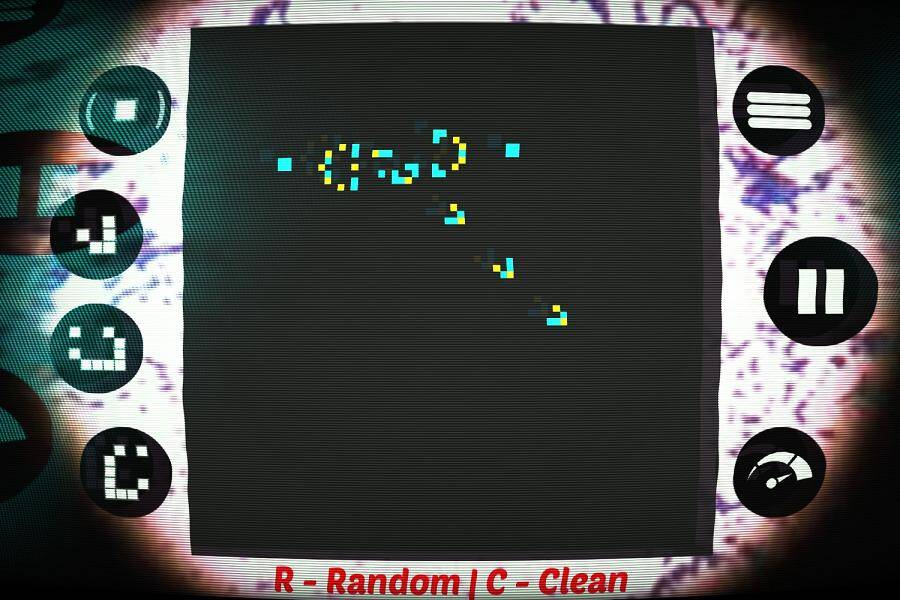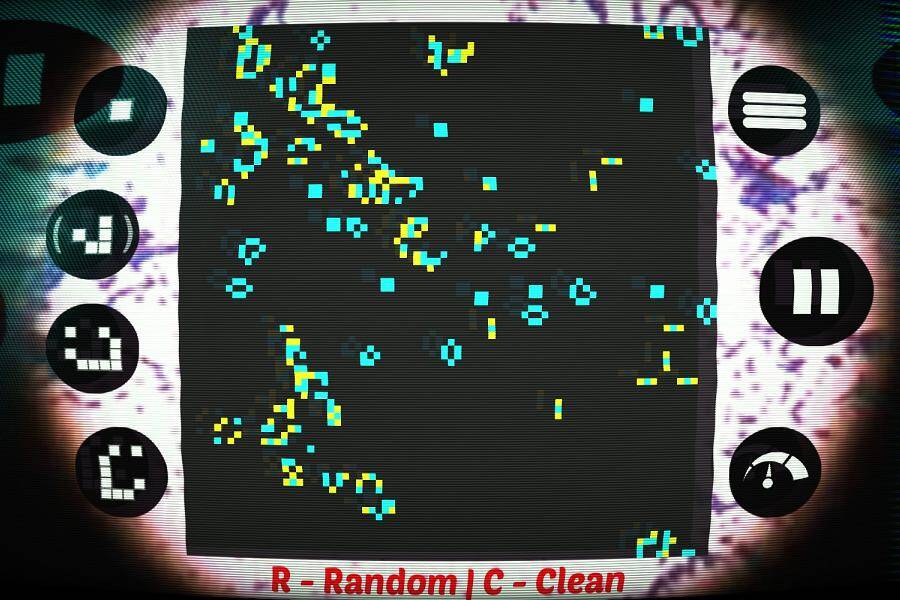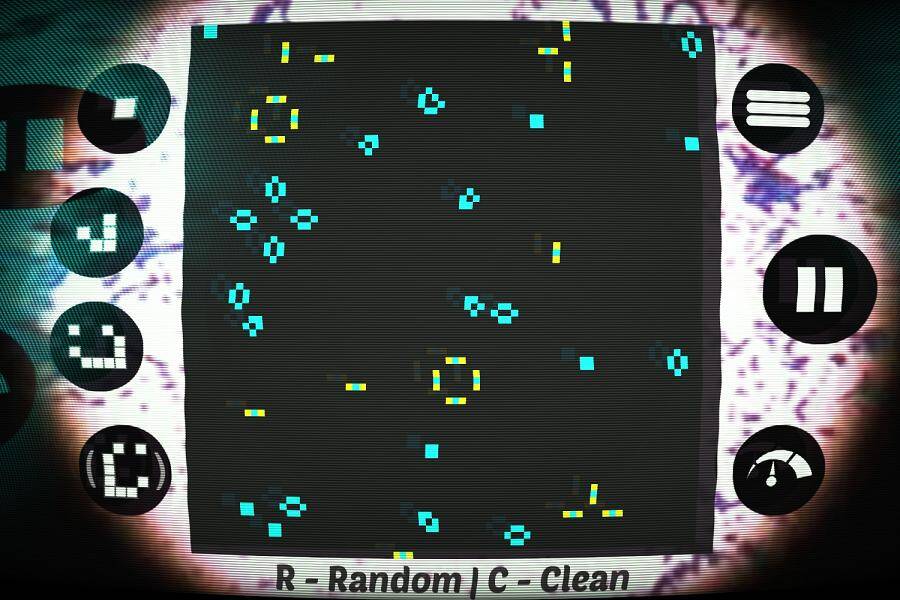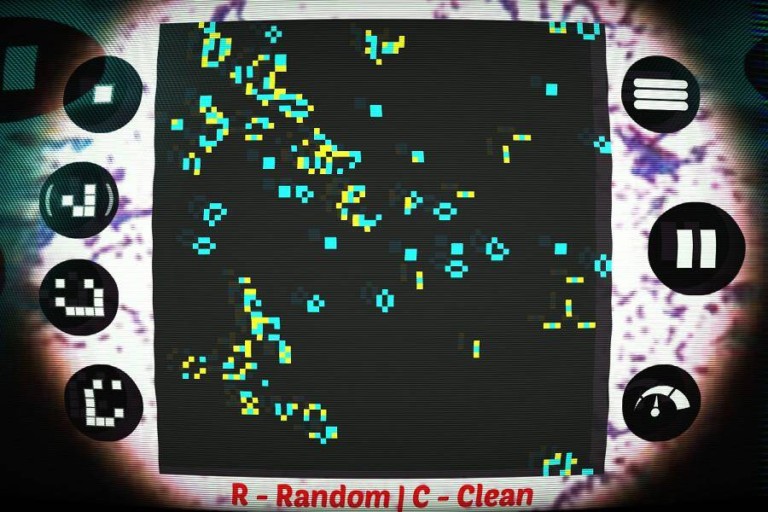Bacteria – What We Think:
When I approached Bacteria, I wasn’t sure what to make of it. Is this a game? Some sort of simulator? A puzzler? As it turns out, Bacteria sits somewhere between the three. I soon realized that I had read about something similar before, and indeed, Bacteria is based on Conway’s Game of Life, a “zero-player game” that simulates life using a grid populated by living and dead cells. The user only specifies starting conditions and then watches the simulation play out. Bacteria provides a little more user interaction, but the principles are very similar to those of the 1970 original.
Bacteria has no narrative, although its title implies a theme of microscopic life (the original Game of Life has numerous potential applications, human population simulation being one of them). The game itself, however, is very similar to its precursor and utilizes the same rules. Any live cell with too few or too many neighbors dies, cells with the correct number of neighbors endure, and dead cells with three live neighbors come to life. These simple rules can cause unpredictable and visually dynamic outcomes.

Going Viral
Bacteria offers three game types: a hard mode (no normal or easy modes are provided), an extra frustrating monochrome mode and a simulation mode. The first two options pack a large selection of challenges, which are unlocked sequentially. Both task the player with removing “unstable” cells from the board by making changes to a small area of the screen. You can place individual live cells or clusters of pre-organized live cells that interact in such a way as to make them mobile. Using these tools, you must remove the unstable cells outside of your area of control.
Whilst living and dead cells are controlled by a mathematical system, it was still very difficult to predict the outcome of my actions. This, unfortunately, leads to a sense of randomness, and it is maddening when – having neatly cleansed the majority of a screen – one small reaction causes cells to explode to life across the whole board. It is fascinating to watch, but irritating when one is trying to progress.

Simulation mode allows you to modify any part of the board, and I found this considerably more interesting than the main game. It’s intriguing to see how even small changes can cause far-reaching reactions, but even this fascination has limited appeal when the play area is limited to one looping board.
Mr. Clean’s Fever Dream
For example, in my research about Conway’s Game of Life, I discovered an interesting curiosity called Gosper’s Glider Gun, a construct of live cells that creates other, moving clusters of live cells. I gleefully (and painstakingly) built my own glider gun, but of course its glider-firing moments were short-lived, as its own projectiles looped around and disrupted its production process. Just one example of how the screen-looping hinders the potential for creative fun in Bacteria.
To be fair, Bacteria is distinct from the Game of Life in that it tries to be more of an interactive game rather than a simulator, and in this it rightly applies more restrictions. The level-based modes are extremely challenging and could last for a long time for any players intrepid enough to stick with the game for the required duration. Personally, however, I’m more fascinated by the kind of constructs one can build within the algorithms of the game.

Little window dressing is provided to decorate the simple nature of Bacteria’s visuals; only the menu features any real aesthetic attention, and even this is minimal. The music, on the other hand, serves to provide a relaxing backdrop to the experience, which I found to be quite apt for watching the chaos of simulated life unfold.
Bacteria is an interesting experiment; an attempt to turn a self-proclaimed zero-player game into a single-player game. In this endeavor, Bacteria has succeeded.
Start Spreadin’ The News
Is it fun, though? I found the challenges only temporarily engaging, as it is far too tricky to predict if cell placement choices will yield positive results. The game is also a little clunky when you want to reset a level, as one must back out to the main menu first.
Despite these issues, Bacteria is an intriguing experience that draws attention to a perhaps even more fascinating simulator, and it is more than worth its humble price.
Bacteria is available via Steam.
[xrr rating=”3/5″]
Watch the trailer for Bacteria below:





